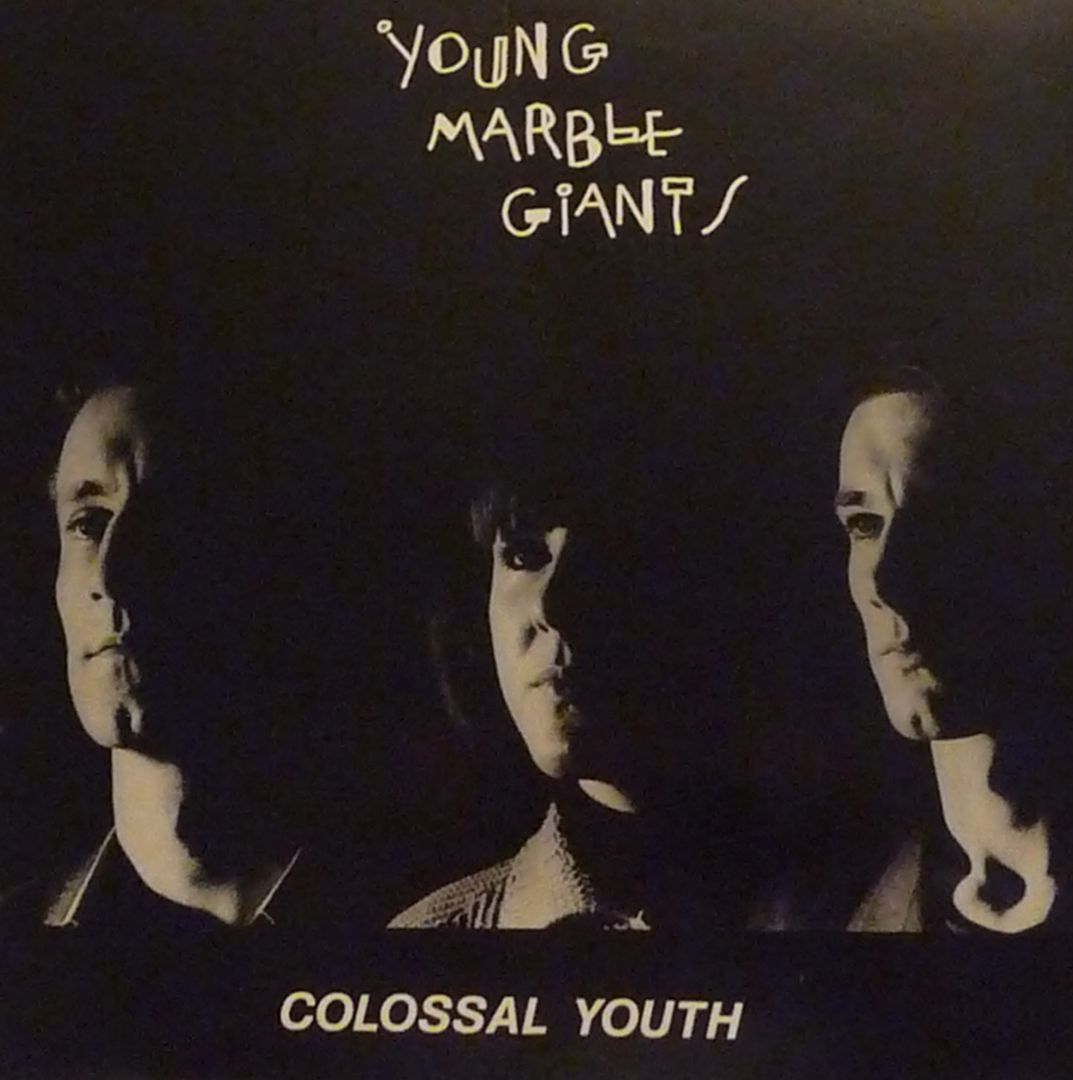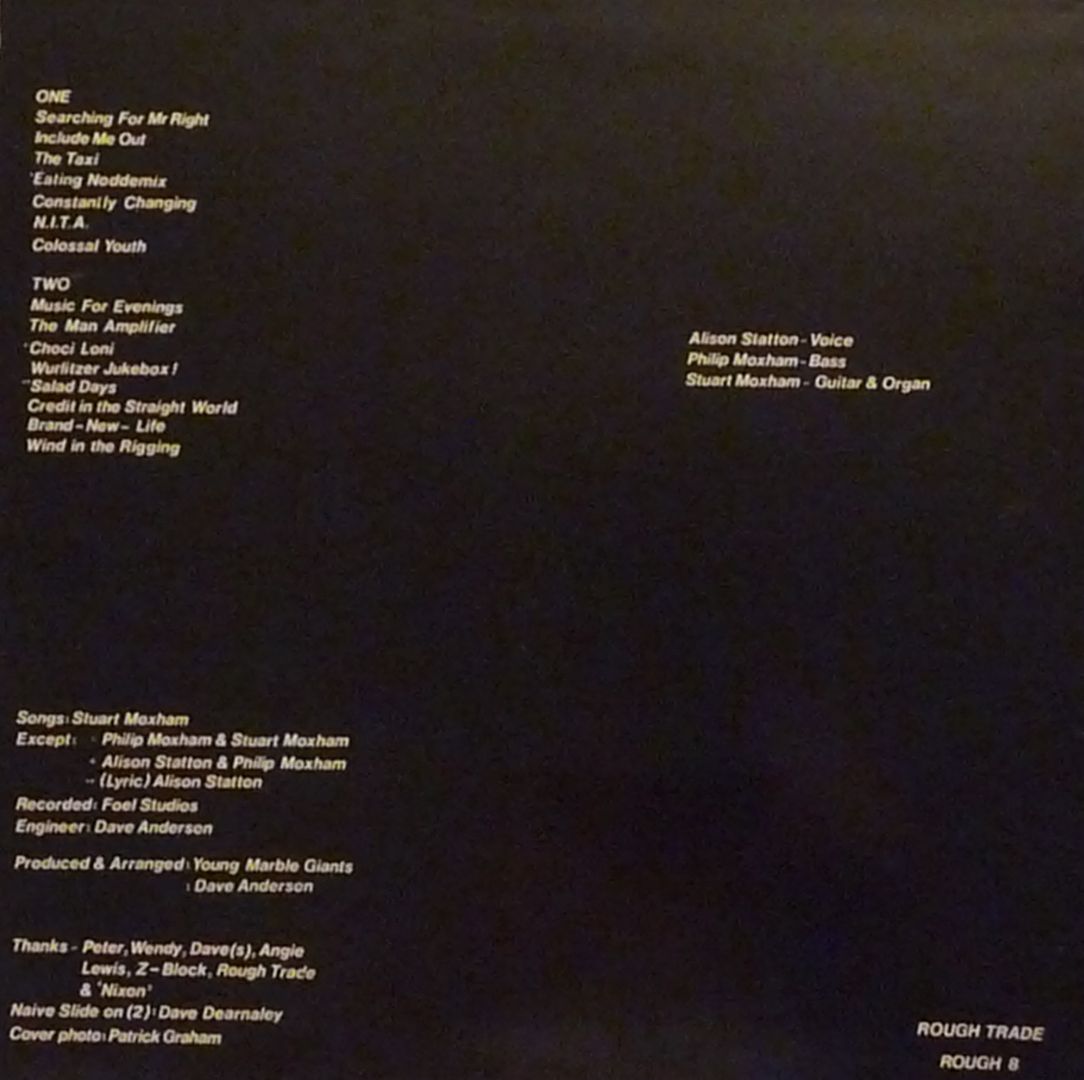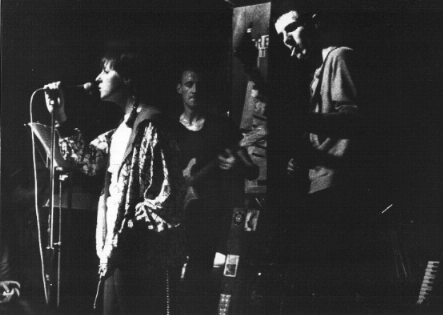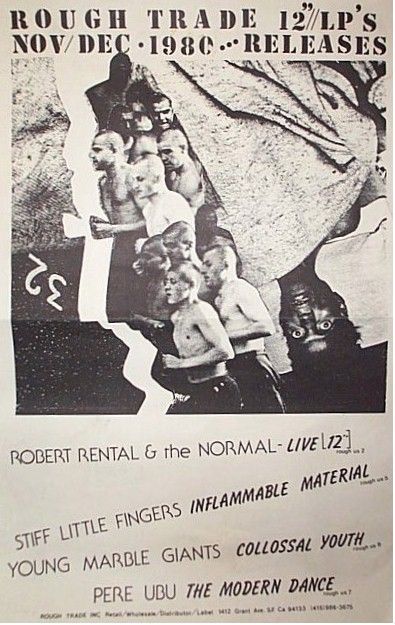

A spectacular atmospheric record on the once essential Rough Trade record label by Young Marble Giants. The band adopted a minimal approach to their song writing which worked wonderfully and this debut (and only) LP released by the Rough Trade still sounds fresh over thirty years later on. A marvelous testament to the band and to the record label.

Sounds, May 17, 1980
Maybe it’s a symptom of the generally stale and unimaginative after-Punk musical spectrum, but there doesn’t seem to be any longer a space at all for quiet music.
Apart from MOR slush and anything calculatedly tepid from the charts, and with the recent mighty exception of Joy Division’s remarkable “Atmosphere,” quiet, imaginatively unflustered music seems to have quietly gone down the drain in a big way.
The explanation, of course, is easy. The music scene is in a staccato state of mock-vicious toil and bluster, all big and colourful and overproduced until it’s indecent. As now championed with Dexy’s “Geno” (which as a matter of fact I’m quiet partial to) at the peak of the chart pile, the trend is for sheer noise.
It doesn’t matter whether it’s got backbone or not, it has to be shiny and sure of itself, and the only way you can sneak out of that in the big stakes is to be like the Cure and Genesis and disappear up your own Moog being sincere and wackily modern(e).
Even in the seventies, when things were in a similarly h.m./pseud-rock dominated state, you had the efficiently low-decibelled fine arts of the likes of Richard Thompson, Roy Harper, Ivor Cutler or Country Joe, each in their own way as subversive as anything else around.
Now it’s pure Hollywood, you have to have a degree in chat-show politics to be a rock performer, and a big reactionary mouth to back it. Which brings us to the uniqueness of Young Marble Giants. The first impression is: God, have they a nerve! Stepping into the showbiz whirlpool of ’80s rock & roll with a pitter-patter trickling of songs that have more silence than sound! You can hardly hear them!
To which the candid young Marble’s fan with an eye for logistics must reply, Colossal Youth, the colossally quiet album, is in the Alternative charts (Ugh! I hate those tidy charts!) and kicking: it looks like quiet music never went away.
I always say that for every supreme truth you must be able to take the opposite, the complete reverse of that truth and prove it real as well, like two poles of a unity. In this sense, Colossal Youth is the opposite of “Anarchy In The UK” or “Clash City Rockers,” and it’s every bit as good as well. It almost affected me as much, made me feel almost as excited and surprised when I first heard it. Literally speaking, it is an exceptional record (my favorite album of the year so far with Magazine’s The Correct Use of Soap). It stands out a mile.
Stuart Moxham, disarmingly tall writer of Marble tunes, draws some light on this when he says, “Young Marble Giants is a reaction to everything successful today…” which although misleading in terms of presenting you with idea of the music’s content, does indicate how far away the Giants are from modern mass trends.
Like Swell Maps were to DIY last year, Young Marble Giants are a splinter representation of “how else it can be done,” of new (and not really so new) ways of communicating through music. By mellow subtlety. By extravagant sparsity. By not pushing it too hard.
I’ve heard tracks from Colossal Youth on everything from Radio London morning kiddies’ shows to the horrifically young and trendy Radio 1 spots, and it’s made me feel good and surprised each time, because the music has sounded right, not at all in keeping with the village idiot’s idea of a Rough Trade group, but still a little spooky and full of character.
Images the music makes are: tiny Welsh tearooms, childhood fear, coffee-bar intimacy, murder, lost love, sleep, tension and longing constantly underlied by an enduring eeriness in the music which I find similar to the now-forgotten eccentricity of Ivor Cutler.
“We’ve never even heard of Ivor Cutler!” Stuart protests and I believe him. Young Marbles are very separate, they come from Cardiff and they’re still a little frozen in “provincial” (Stuart’s word) ways, so that the bravely detached aura of the music is readily explained.
While everywhere from Coventry to Liverpool to Belfast to Dorset has had its rock & roll moments in the recent past, Wales has come up with absolutely nothing, leaving you wondering whether Wales hadn’t really given up after Andy Fairweather-Low and Man (and with that track record, you couldn’t have blamed them).
“Cardiff is a really awful place…it’s industrial, a depressed area…and it’s not only provincial, it’s also Welsh which means it’s also very self-important. Quite frankly I don’t like it very much…” Stuart Moxham opines.
Stuart is already based in London, while the other two Giants, his almost equally lanky brother Philip and singer Alison Statton, are thinking about moving up too. It will be interesting to see if the change in environment affects the music and its quality, because Colossal Youth really does smack of an album done in a particular place and in a particular atmosphere.
Will movement from that very special, in rock & roll terms profitably secluded atmosphere, change the music, make it less special, less original?

We’ll see. For now, Colossal Youth is the criteria to judge the Giants on, and that’s plenty. I talked to the band last Friday at Rough Trade and was first struck by how peculiar they looked. I’m sure it’s not my imagination; they looked provincial and slightly wholesome and innocent, though not vulnerable.
Stuart tells me they get old people liking the music, which fits. They bring their dog with them to gigs, and that too fills out the impression of “Three Men in a Boat” that comes through, with Alison in particular looking wide-eyed and straight out of a Girl’s Own story, as the heroine, of course. You get the impression she’s going to fall over any minute in the big-city smog, and that she’s been brought up on fresh cow’s milk and healthy Girl Guide rambles through the Welsh valleys. She looks frighteningly innocent.
Stuart: “When we first started playing we felt almost apologetic because we weren’t loud and danceable…we were quiet and slow and melodic and all those things you shouldn’t be, especially after Punk…”
The band haven’t always been so quiet; rather they’ve progressed that way through the odd “rockier type band” along the way, finally coming to the conclusion that this is how they should sound.
Is the quietness conscious then? Stuart: “I don’t know if that was deliberate in a way…we’ve tried to go against every possible grain at once and still come up with something that’s an essence of what we’re trying to do…you know, not to conform to anything at all.”
The important thing to note at the moment is that Young Marble Giants are a serious proposition and Colossal Youth is no one-off, bizarre fragment of talent.
Stuart in particular, as well as writing the bulk of the material, seems like the organizing, getting-it-together figure. Natch: the band have a new single out at any time (three track, “Final Day,” Cakewalking” and “Radio Silents”), together with a series of gigs around the country. They mean business, of sorts.
Stuart: “We never aimed to do this. We are kind of isolated down in Cardiff in our front-room, working from inside ourselves in a way, and what we’re doing just happens to be acceptable at the moment…”
Philip, significantly: “We’ve no experience of the modern thing…the music we listened to before was the innovators like Kraftwerk, Roxy and Eno…it’s only recently since we’ve joined Rough Trade that we’ve heard about Cabaret Voltaire and the Slits and the rest…”
Stuart: “You see, we’d given ourselves a deadline. I was going to move to Berlin and the band were going to split up at Christmas time…Rough Trade were really timely. It’s amazing because everything’s fitted for us really well and naturally. There’s been no unpleasantness, nothing’s been forced…”
Rough Trade stepped in when they heard the band on a Cardiff compilation, and with a sharpness that’s far too often slagged by cruds who can’t think beyond the big-label time-space, told them, in Stuart’s words, “do whatever you want to do.” Hence, Youth (“We thought it would make an impact if we came from nowhere with an album instead of a single”) and work with producer Dave Anderson of Mo-Detted, Logic and Pop Group fame.
Stuart: “Dave’s an old rock star (!) and in a way he didn’t know what to expect from us, and I think even then we surprised him. We did the album in five days…twenty minutes for a mix, literally!”
The album’s eerie wheezy sound comes partly from the nature of the mix, which was hurried and minimalized by the stark input of only three instruments, including Alison’s voice, at any given time.
Stuart: “When you write music you write the gaps in between as much as you write the music. There’s ways of making a sound full without having lots of instruments playing. I think you can lose things otherwise…”
I mention the fact that the songs are often obsessed with food; they react surprised, astonished, and Stuart brings up a more conscious theme in the music. “The songs are all based on things that happened to me with my girlfriend. That’s the most important thing that’s happened to me in years, meeting this particular girl and what we’ve been through. We broke up and now we’re back together again, it’s been a really stormy relationship…”
Thinking for a moment on the frequent chilliness that comes across in Alison’s Sunday school voice, I refer to Philip’s “The Man Amplifier” on the album.
Stuart: “Philip wrote that after seeing a programme about a robot you strap yourself into and it amplified your movements, so that if you want to pick your nose and it isn’t programmed to do it, it’ll pull your head off. It’s a really primitive American idea…that songs always sounds as though it’s about to fall apart, and that’s what I imagine the Man Amp to be like, a kind of prototype, a primitive thing.”
He talks about Alison’s extraordinary voice: “It’s really weird, because what happens is I write the melody and sing it, and then Alison sings it back. But when I sing it, it tends to be emotional because the lyrics are mine. Alison on the other hand is really laid back and unemotional sounding. It’s a strange paradox, a disinterested voice singing about something emotional.”
I leave him to ponder on the consequences of that.
Some days later I’m sitting here toying with notions of Young Marbles as “psychedelic bedsit,” “uniquely old-fashioned” and “coldly romantic,” flicking away each one as it forms, really hoping only that Young Marbles discover the mind-space and the time-space in a clapped out world to be, nothing more or nothing less than, quiet. Long may they be a whisper.
DAVE McCULLOUGH
chas
October 8, 2011 at 4:31 pmSo many times I look on this site and think ‘I remember that bands name, I should give it a listen’ and then never get round to it. Did today and was well rewarded – some beautiful songs on this. Thanks for making the effort